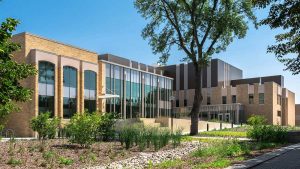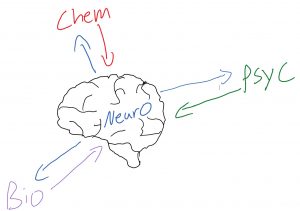
All college seniors naturally find themselves at a point of reflection. During this time, seniors entering the work force, graduate school, medical school, ext. find themselves contemplating not only what’s next, but also the previous 3 years. Personally, I’ve had a significant amount of time this semester to look back at my time at Concordia and contemplate what I’m truly going to take away as a neuro and psych major. Neurochemistry gave me the opportunity to do this in a way I never thought possible.
The Landscape of Neuroscience
Neuroscience is a naturally interdisciplinary fields where chemistry, biology, and psychology all come together to tell the story of the brain. As a psychology major, I naturally find myself leaning towards psychology side of neuroscience, while the chemistry aspect of this story is something that made me nervous. I walked into the first day of Neurochemistry where many others had 3 full years of chemistry under their belts, and there was me armed only with my survey of organic and biochemistry class from sophomore year. While I was nervous, I quickly realized this is a class where my skillset would not hurt me, but help me and the others around me. The neurochemistry class is a team, with each member tackling questions and wrestling with ideas through their own expertise. I often found myself investigating the cognitive and psychological implications of various diseases, while I was very appreciative of those who studied the individual receptors and kinases of signaling cascades that I would have been scratching my head if I had to explain. In this facet, I see us going on to tackle the worlds problems in much a similar way. In any team, you rely on each other’s strength and weaknesses to come together to accomplish a goal, and it was fun to see this shine through in an academic environment. Through this environment, we naturally followed the goals for liberal learning that this college values greatly.
We fostered a love for learning as each week we had the opportunity to investigate what made our own wheels turn, and more importantly explain that in a way that makes sense to someone who may not know as much about that question.
We developed critical foundational skills allowing us to communicate and work together to share our ideas in one on one, and group settings where our intellect could shine. We listened and grew with each-other through discussions that merged science with everyday life.
Throughout the class, we saw how science can bring complex issues together. From the spiritual and implications of schizophrenic hallucinations, to the complex societal issues surrounding obesity, as both scientists and citizens we examined hundreds of interdisciplinary connections reaching much further than an 8-page review article.
One of the beautiful things about neurochemistry is the fact that it can be applied to each of our lives. Everyone has felt stressed, maybe had a sugar craving that felt like a withdrawal, or listened to their favorite song and felt a surge of reward. Understanding the neurochemical implications of these examples contributes to a deeper sense of self that brings science together with our conscious perception of the world.

Artstract by B. Swanson
BREW
And of course, the most pressing question, how did we BREW? The reality is, we forget most of what we learn in our classes. We must ask ourselves, what can I takeaway from Neurochem and why does it matter? I think each of us should reflect and answer these questions for ourselves because it varies person to person. For me, I come from a strong psychology background, but the world of psychology is changing. With each fMRI and EEG study psychological concepts that were once explained by a superego can now be better explained though the function of the pre-frontal cortex and a signaling cascade. There are hundreds of examples where previous theories are now supported directly or indirectly by neural evidence. Indeed, in my view the world of psych and neuro are on a collision course and it would be wise to understand both worlds to become a modern psychologist. Looking back at my Concordia education, this is the edge I try to incorporate into each graduate school application. What I loved about this neurochemistry class is I saw so many different skillsets from my classmates come together. I saw neuro merge with psych, bio, and of course, chemistry. As each of us set out to contribute to the world, we do so armed with our own unique knowledge and experiences. In this class, we added diversity to our own worldviews over the course of the semester by taking in each other’s unique expertise and points of view. I am excited to see how this impacts the future doctors, professors, researchers, ext. in that room as we all integrate our liberal arts education with the hard sciences. While we all see the world through our own experiences, over the course of this semester, we merged our knowledge and experiences giving each of us a stronger and more diverse worldview. This will ultimately contribute to us tackling the worlds problems much like we tackled each paper that came our way; through a diverse set of perspectives that, when merged, created an enviornment of learning that would not have been possible without such variety. Thank you to you all for a fantastic semester!